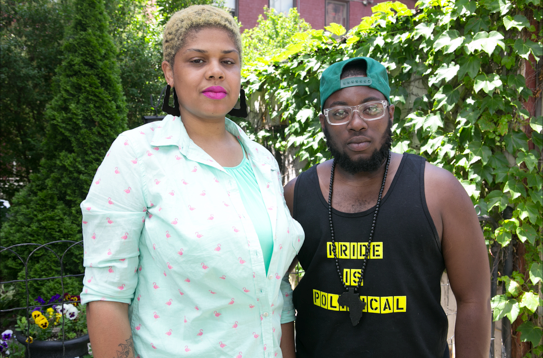Editor’s note: Shortly after this story was posted, Pittsburgh Pride headliner Iggy Azalea cancelled her concert at Saturday’s Pride in the Street event. In cancelling her appearance Azalea wrote in a statement: “I feel my participation at this point would only serve to further distract from the true purpose of the event.” You can read about Azalea's cancellation here and we’ll have more details as they become available on our Blogh.
Just hours after the Delta Foundation announced Iggy Azalea as the headliner of this year’s pride festivities, the ensuing backlash caught the attention of two local black LGBT activists.
But what surprised Michael David Battle and Joy KMT wasn’t so much that people were angry over Delta’s decision to hire Azalea, who has been accused of sending racist and homophobic tweets that have since been deleted.
Instead, they were surprised by the systemic criticism that began to emerge of Delta Foundation itself, the organizer of Pittsburgh Pride. Critics accuse Delta of catering mostly to affluent, white gay men.
People were saying, “This is oppressive, this is violent, this is erasure,” Battle says. “We were like, ‘Wow, this is stuff we’re usually saying.’ This is the first time we saw the community galvanize like that.”
Battle and KMT are trying to build on that momentum to create an alternative to Pride — called “Roots Pride Pittsburgh” — which is pitched as both a protest of Delta and as a more inclusive celebration of LGBT people of color and other marginalized groups. And they’ve racked up some impressive supporters: from Pittsburgh City Council President Bruce Kraus to the local chapter of the Gay, Lesbian and Straight Education Network (GLSEN), among other organizations.
Part of their critique of Delta is that it claims to be the “leading LGBT organization in Western Pennsylvania” and to serve as “a vigilant catalyst for change,” according to Delta’s website. Yet much of its resources are essentially devoted to Pride itself, not investing in advocacy efforts or the rest of the community. Critics also argue that Delta’s title as a “foundation” is at odds with its spending priorities. Of the $929,689 the nonprofit spent in 2013, $18,549 went to “awards and grants,” Delta’s most recent federal filing shows.
Fundamentally, though, Roots Pride supporters say Delta simply doesn’t represent marginalized groups within the LGBT community, and often cite the Delta board’s overwhelmingly white male composition as evidence of that.
But some people connected to Delta defend the organization against the criticism that it is not inclusive and seem puzzled by that assessment.
“If there was any exclusion, I don’t think it’s intentional in any way,” says Jim Sheppard, a current Delta board member.
Sheppard argues that Delta has been hugely successful in growing Pride to include “an allied community we wouldn’t normally share a party with.” Indeed, Pride now attracts nearly 100,000 attendees each year. The argument Delta has successfully made, Sheppard notes, is “ʻWe’re just like you’ … it changes hearts and minds.”
But for some Roots Pride supporters, the idea that members of the LGBT community should be normalized is part of the problem.
KMT (pronounced k’met) makes the argument this way: “The material reality of queer/trans people of color in this city is different than the material reality of a cis, white gay man … people all over are grappling with, ‘How do we make a society and culture that honors and respects all of us?’”
It’s a question organizers of the nascent Roots Pride are just starting to tackle.
The fundamental problem that Roots Pride is dealing with — the exclusion of marginalized communities — is undeniably complicated. But one reason it has attracted wider support, many argue, is that resentment of the Delta Foundation has long festered under the surface.
“This goes far beyond Iggy Azalea,” says Anne Lynch, operations manager for Three Rivers Community Foundation, an organization that distributes money to LGBT organizations, among other causes. (Lynch’s organization has given $250 to Roots Pride.) “This has opened up a conversation that has been simmering under everything for the last several years.”
The critiques are “certainly not new,” agrees Vanessa Davis, who heads the local chapter of GLSEN and who announced that the group would not march in the Pride parade this year.
“I recognize that the Delta Foundation has done a really great job of growing Pride events,” Davis says. “They also do programming for Pittsburgh Red for World AIDS Day and have also done some political-advocacy work as well and work with law enforcement. [But] I just don’t know how one asserts itself as the leading LGBT organization when a lot of what they do is throw parties. They don’t work with youth populations whatsoever.”















